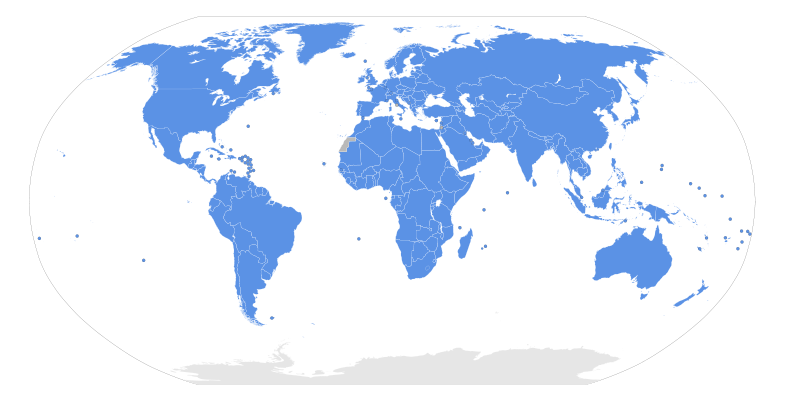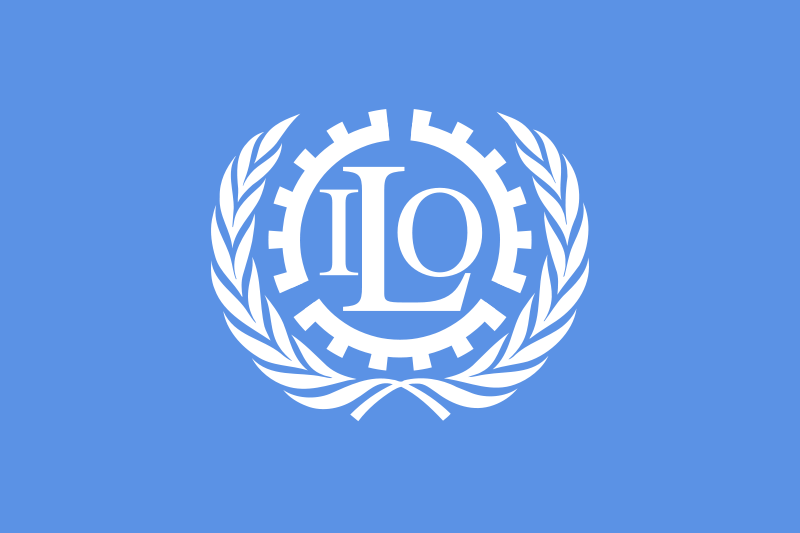International Labour Organizanition
 |  |
Name: International Labour Organizanition | |
Acronym: ILO | |
| Year of foundation: 1919 | |
| Headquarters: Geneva, Switzerland | |
| Parliament: International Labour Conference | |
| ILO documents: go to page | |
| Official website: go to page |
Description
The International Labour Organization (ILO) is the tripartite UN agency that operates for the improvement of working and living conditions through the adoption of international labour conventions and recommendations, setting minimum standards in fields such as wages, hours of work and conditions of employment.
Member States
ILO, which originally comprised 45 countries, now numbers 183 members, namely: Albania, Argentina, Armenia, Australia, Austria, Azerbaijan, Belgium, Bolivia, Brazil, Bulgaria, Canada, Chile, Colombia, Costa Rica, Cuba, Denmark, Ecuador, Estonia, Finland, France, Georgia, Germany, United Kingdom, Greece, Guatemala, Haiti, Honduras, Hungary, Iceland, India, Italy, Japan, Latvia, Liberia, Lithuania, Luxembourg, Mexico, Netherlands, New Zealand, Nicaragua, Norway, Panama, Paraguay, Iran, Peru, Poland, Portugal, Romania, San Marino, El Salvador, Serbia, Thailand, Spain, Sweden, Switzerland, Ukraine, United States, Uruguay, Venezuela, Russian Federation, South Africa, Turkey, Ireland, Algeria, Egypt, Syrian Arab Republic, Dominican Republic, Israel, Indonesia, Afghanistan, Ethiopia, Madagascar, Malaysia, Mozambique, Philippines, Iraq, Congo, Tunisia, Morocco, Angola, Viet Nam, Namibia, Senegal, Guinea, Cote d'Ivoire, Benin, Burkina Faso, Cameroon, Djibouti, Togo, Cambodia, Lao People's Democratic Republic, Guinea-Bissau, Cyprus, Mauritania, Mali, Guyana, Seychelles, Cape Verde, Malawi, Mauritius, Malta, Equatorial Guinea, Korea, Libyan Arab Jamahiriya, Trinidad and Tobago Mongolia, Lebanon, Belarus, Myanmar, Singapore, Pakistan, Sri Lanka, Sudan, Zimbabwe, Lesotho, Nepal, Jordan, Saudi Arabia, Bahamas, Barbados, Belize, Gambia, Ghana, Jamaica, Somalia, Timor-Leste, Niger, Nigeria, Zambia, Sierra Leone, Fiji, Eritrea, Suriname, Samoa, Botswana, Brunei Darussalam, Dominica, Kenya, Grenada, Uganda, Saint Lucia, Swaziland, Sao Tome and Principe, Vanuatu, Comoros, Maldives, Antigua and Barbuda, Saint Kitts and Nevis, Congo, Central African Republic, Chad, Gabon, Bahrain, China, Marshall Islands, Kuwait, Qatar, Oman, Rwanda, Burundi, Tanzania, Papua New Guinea, United Arab Emirates, Bangladesh, Kiribati, Tuvalu, Saint Vincent and the Grenadines, Yemen, Kyrgyzstan, Slovenia, Republic of Moldova, Croatia, Uzbekistan, Kazakhstan, Bosnia and Herzegovina, Tajikistan, Turkmenistan, Slovakia, Czech Republic, The former Yugoslav Republic of Macedonia, Montenegro.
In 1977 the US exercised the right to withdraw from the Organization on mainly political grounds but resumed full participation in February 1980.
Brief History
The Organization was established as an autonomous institution within the system of the League of Nations its Constitution being adopted on 11 April 1919 and representing an integral part of the Peace Treaties.
The founding fathers of the ILO had made great strides in social thought and action before 1919. The core members all knew one another from earlier private professional and ideological networks, in which they exchanged knowledge, experiences, and ideas on social policy. Prewar "epistemic communities," such as the International Association for Labour Legislation (IALL), founded in 1900, and political networks, such as the Socialist Second International, were a decisive factor in the institutionalization of international labor politics. In the post-World War I euphoria, the idea of a "makeable society" was an important catalyst behind the social engineering of the ILO architects. As a new discipline, international labor law became a useful instrument for putting social reforms into practice. The utopian ideals of the founding fathers - social justice and the right to decent work - were changed by diplomatic and political compromises made at the Paris Peace Conference of 1919, showing the ILO's balance between idealism and pragmatism.
The first annual conference (referred to as the International Labour Conference, or ILC) began on 29 October 1919 in Washington DC and adopted the first six International Labour Conventions, which dealt with hours of work in industry, unemployment, maternity protection, night work for women, minimum age and night work for young persons in industry. The prominent French socialist Albert Thomas became its first Director General.
Then the International Labour Conference held in Philadelphia adopted on 10 May 1944 a Declaration concerning the aims and purpose of the Organization and expanding its tasks (Philadelphia Declaration). The Constitution was subsequently amended in order to sever the link with the League of Nations and to anticipate a new relationship with the UN. The Organization became the first specialized agency associated with the UN through the conclusion of a formal relationship agreement which entered into effect in December 1946. The revised Constitution of the Organization entered into force on 28 June 1948. Other amendments were subsequently introduced on several occasions. According to the Instrument of Amendment 197 (adopted on 19 June 1997 but not yet in fore), it will become possible to abrogate any Convention if it appears that the Convention itself has lost its purpose or that it no longer makes a useful contribution to the achievement of the objectives of the Organization.
As distinct from the automatic membership of the Organization originally provided for all members of the League of Nations, membership is now entirely voluntary. Members of the UN may accede to the Organization in conformity with current provisions, Any sovereign country, not a member of the UN, may be admitted to the Organization by a vote concurred in by two-thirds of the delegates attending the session of the International Labour Conference, including two-thirds of the government delegates present and voting. Unilateral withdrawal is allowed upon submission of written effect notice to that effect to the Director-General and takes effect two years there-after. Withdrawal do not affect the continued validity of obligations arising under any international labour convention ratified by the country which terminates its membership.
ILO Structure and Decision-making Procedures
The Organization's structure is made up of the International Labour Conference, the Governing Body, and the International Labour Office.
The International Labour Conference
The Conference is the supreme deliberative organ and meets annually in Geneva, with a session devoted to maritime questions when necessary. National delegations are composed of two government delegates plus one delegate representing employers and one representing workers. As every delegate is entitled to vote individually non-government delegates can speak and vote independently of the views of their respective Governments. The primary function of the Conference is to adopt international labour conventions and recommendations by a two-thirds majority of the votes cast by the delegates present.
The Governing Body
The Governing Body (elected by the Conference for a three-year term) is the Organization's executive council. It meets three or four times a year in Geneva to implement policies and programmes and to supervise the work of the International Labour Office and of the various committees and commissions.
The Governing Body has the same tripartite structure as the Conference' It is composed of 56 titular members, 28 representing governments, 14 representing employers and 14 representing workers. Of the 28 persons representing governments, 10 are appointed by the members of "chief industrial importance" (at present Brazil, China, France, Germany, India, Italy, Japan, Russia, the UK and the US), and 18 are appointed by the members selected every three years by the government delegates to the Conference, excluding the delegates of the 10 members mentioned above. Employers' and workers' members are elected as individuals, not as national candidates. Among the committees set up by the Governing Body is the nine member tripartite Committee on Freedom of Association, tread in 1951 to examine complaints in the field of freedom of association.
The International Labour Office
The International labour Office is headed by a Director-General. It serves as Secretariat, operational headquarters, research centre and publishing house. In particular, it collects and distributes information, assists governments upon request in drafting legislation on the basis of decisions of the Conference, administers the technical cooperation programmes, undertakes special investigations and provides machinery to assist in the effective application of conventions. Operations are decentralized to regional, area and branch offices in about 40 countries. Regional offices are based in Abidjan (for Africa), Lima (for the Americas). Beirut (for Arab States), Bangkok (for Asia and the Pacific) and Geneva (for Europe and Central Asia).
International Labour Code
One of the principal functions of the ILO is setting international labour standards through the adoption of conventions and recommendations covering a broad spectrum of labour-related subjects and which, together, are sometimes referred to as the International Labour Code. The topics covered include a wide range of issues, from freedom of association to health and safety at work, working conditions in the maritime sector, night work, discrimination, child labour, and forced labour.
1998 Declaration on Fundamental Principles and Rights at Work
In 1998, the 86th International Labour Conference adopted the Declaration on Fundamental Principles and Rights at Work. This declaration identified four "principles" as "core" or "fundamental," asserting that all ILO member States on the basis of existing obligations as members in the Organization have an obligation to work towards fully respecting the principles embodied in the relevant (ratifiable) ILO Conventions. The fundamental rights concern freedom of association and collective bargaining, discrimination, forced labour, and child labour. The ILO Conventions which embody the fundamental principles have now been ratified by the overwhelming majority of ILO member states, not least because of the declaration's denomination of the principles they contain as "fundamental".
Conventions
Adoption of a convention by the International Labour Conference allows governments to ratify it, and the convention then becomes a treaty in international law when a specified number of governments have done so. But all adopted ILO conventions are considered international labour standards regardless of how many governments have ratified them.
The coming into force of a convention results in a legal obligation to apply its provisions by the nations that have ratified it. Ratification of a convention is voluntary. Conventions that have not been ratified by member states have the same legal force as do recommendations. Governments are required to submit reports detailing their compliance with the obligations of the conventions they have ratified. Every year the International Labour Conference's Committee on the Application of Standards examines a number of alleged breaches of international labour standards.
Recommendations
Recommendations do not have the binding force of conventions and are not subject to ratification by member countries. Recommendations may be adopted at the same time as conventions to supplement the latter with additional or more detailed provisions. In other cases recommendations may be adopted separately and may address issues not covered by, or unrelated to any particular convention.
